
Every year, millions of Americans take medications that don’t belong to them-or take too many, or take them at the wrong time. Some of these mistakes lead to hospital visits. Others cause fatigue, dizziness, confusion, or stomach problems that people blame on aging. But often, the real culprit isn’t age-it’s medication overload.
What an Annual Medication Review Actually Does
An Annual Medication Review (AMR) isn’t just a quick chat about your prescriptions. It’s a full 30-minute evaluation done by a pharmacist who looks at every pill, patch, vitamin, and herbal supplement you’re taking. This includes over-the-counter painkillers, sleep aids, heartburn meds, and even gummies labeled as "natural." The goal? Find and fix problems before they land you in the ER. Pharmacists check for:- Drugs that interact badly with each other
- Doses that are too high or too low
- Medications you no longer need
- Side effects you didn’t realize were drug-related
- Duplicate prescriptions (yes, this happens more than you think)
Why Pharmacists, Not Just Doctors?
Your doctor sees you for 10-15 minutes. They’re focused on your blood pressure, your diabetes, your joint pain. They don’t have time to dig into every medication you’ve been prescribed over the last five years. Pharmacists do. They’re trained to spot drug interactions that even electronic health records miss. A pharmacist knows that taking a common antacid with a blood thinner can reduce the drug’s effectiveness. They know that a sleep aid combined with an antidepressant can cause dangerous drowsiness. They’ve seen it before-and they’ve helped fix it. A study from Outcomes.com found that pharmacist-led reviews reduce hospital admissions by up to 30% in high-risk patients. That’s not a guess. That’s data from real patients who went from taking 12 pills a day to 6-and stopped feeling dizzy every morning.What to Bring to Your Review
Don’t show up with just your prescription bottles. Bring everything.- All prescription medications (even ones you haven’t taken in months)
- All over-the-counter drugs (ibuprofen, melatonin, antacids, cold meds)
- Vitamins, minerals, and supplements (including CBD, turmeric, fish oil)
- Herbal teas or remedies (st. john’s wort, ginkgo biloba, echinacea)
- A list of symptoms you’ve noticed (fatigue, memory lapses, nausea, swelling)
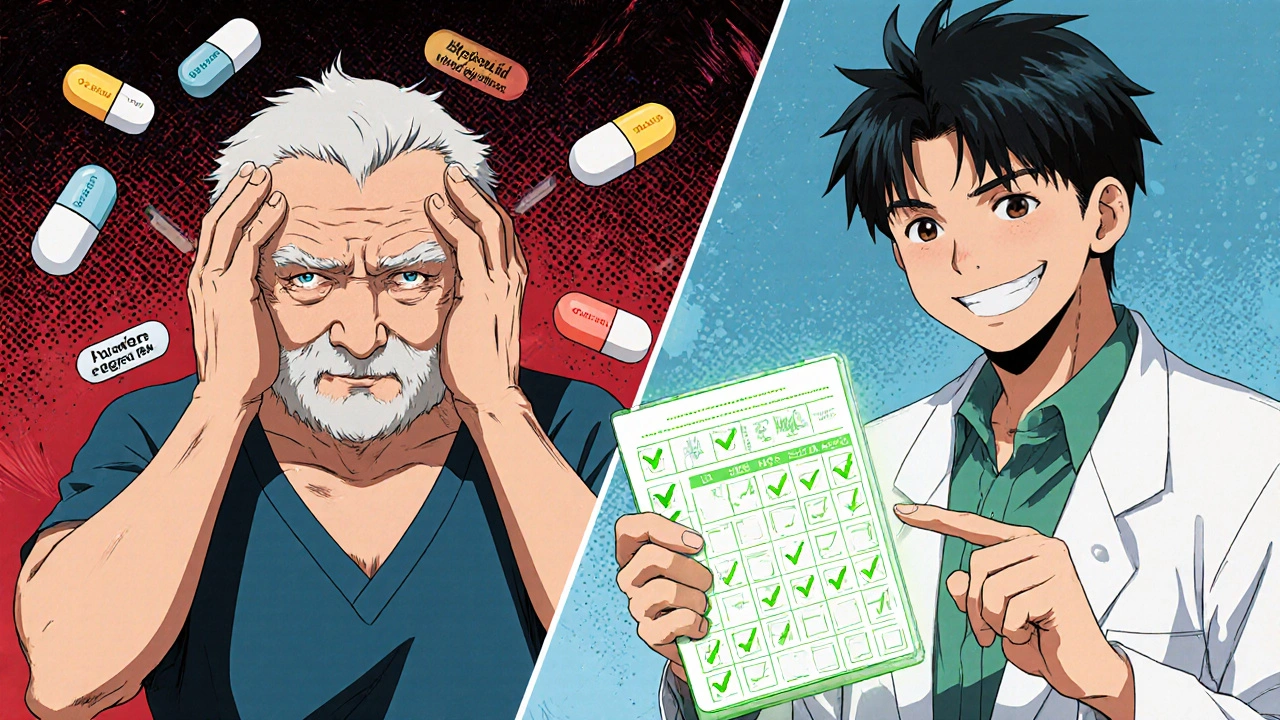
What Happens After the Review?
The pharmacist doesn’t just point out problems. They make a plan.- They may recommend stopping a drug that’s no longer needed
- They might suggest switching to a safer alternative
- They can adjust timing (e.g., taking a statin at night instead of morning)
- They can help you use blister packs or pill organizers
- They’ll send a written summary to your doctor with their recommendations
Who Benefits Most?
This isn’t just for seniors. But if you fall into any of these groups, you’re a strong candidate:- You take five or more medications daily
- You’ve been hospitalized for a drug reaction
- You’ve noticed new symptoms after starting a new drug
- You forget to take pills or take them at the wrong time
- You see multiple doctors and aren’t sure if they know what you’re taking
- You’re on a Medicare Part D plan (you’re eligible for a free CMR)
What Doesn’t Work
Not everyone needs this. If you’re healthy, take one prescription, and feel fine, you probably don’t need an annual review. But if you’re on a complex regimen-or if you’ve ever thought, "I don’t feel right, but I don’t know why"-then you do. Also, reviews only work if you follow up. About 60-70% of patients who get a recommendation actually act on it. The ones who don’t often go back to the same problems: dizziness, confusion, falls, or hospital stays. Communication gaps between pharmacists and doctors are still a problem. That’s why you need to ask: "Did you send my list to my doctor?" If not, call your doctor’s office and ask them to confirm they received it.Cost, Access, and Next Steps
If you’re on Medicare Part D, your CMR is free. No copay. No deductible. You can schedule it at any pharmacy that offers Medication Therapy Management (MTM) services. Most chain pharmacies like CVS, Walgreens, and Rite Aid do. Independent pharmacies often do too. If you’re not on Medicare, check with your private insurer. Many commercial plans now offer similar services, especially for people with chronic conditions. To get started:- Collect all your medications-today.
- Call your pharmacy and ask: "Do you offer Annual Medication Reviews?"
- Schedule the appointment. It takes 30 minutes.
- Bring your list. Be honest about what you take and what you skip.
- Ask: "What can I stop? What should I change?"
Real Impact: Stories from Real Patients
- A 68-year-old man was taking four different pills for acid reflux. The pharmacist found two were identical. He stopped one. His stomach felt better. He saved $180 a year. - A woman in her 70s thought her memory lapses were normal aging. Turns out, a sleep aid she’d been taking for five years was causing brain fog. She switched to a non-drug option. Her recall improved in weeks. - A man on blood thinners was taking ibuprofen daily for back pain. The pharmacist warned him: this combo can cause internal bleeding. He switched to acetaminophen and avoided a hospital trip. These aren’t rare cases. They’re routine outcomes of a simple review.Why This Matters Now
By 2030, all baby boomers will be 65 or older. That’s 73 million people-many on multiple medications. The CDC estimates that 1.5 million adverse drug events happen every year in the U.S. That’s not just numbers. That’s people falling, getting sick, ending up in hospitals-because a pill they didn’t need was still on their list. Pharmacists are the most accessible healthcare professionals in America. You’re within five miles of one right now. And they’re trained to protect you from the hidden dangers in your medicine cabinet. This isn’t about adding more appointments. It’s about making your current ones safer.Is an Annual Medication Review only for seniors?
No. While seniors are the most common group to benefit-especially those on five or more medications-anyone taking multiple prescriptions, supplements, or over-the-counter drugs can gain from a review. People with chronic conditions like diabetes, heart disease, or depression, even if younger, often have complex regimens that benefit from expert evaluation.
Are these reviews free?
If you’re enrolled in Medicare Part D, yes-comprehensive medication reviews are covered at no cost. Many private insurers now offer similar services for members with chronic conditions. Check your plan’s website or call customer service to ask about Medication Therapy Management (MTM) benefits.
Can my pharmacist change my prescriptions?
No, pharmacists can’t change your prescriptions directly. But they can recommend changes to your doctor and send a detailed report with their findings. Your doctor then decides whether to approve the change. Many doctors welcome this input because pharmacists catch issues they don’t have time to spot.
What if I forget to bring all my meds to the review?
Bring what you can. But know that missing information-especially supplements or OTC drugs-can lead to missed risks. About 40-50% of patients forget to mention non-prescription items. If you can’t bring everything, make a written list with names, doses, and how often you take them. Even that helps.
How often should I get a medication review?
At least once a year. But if you’ve had a new diagnosis, started or stopped a medication, or noticed new side effects, schedule one sooner. Some pharmacists recommend reviews after major life changes-like moving, losing a spouse, or going into a rehab facility.
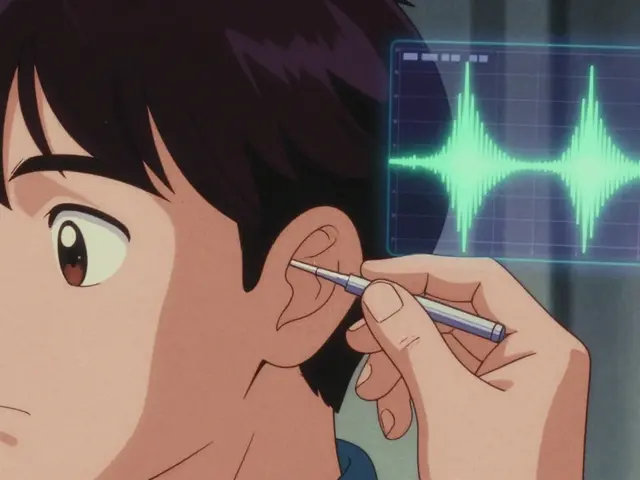
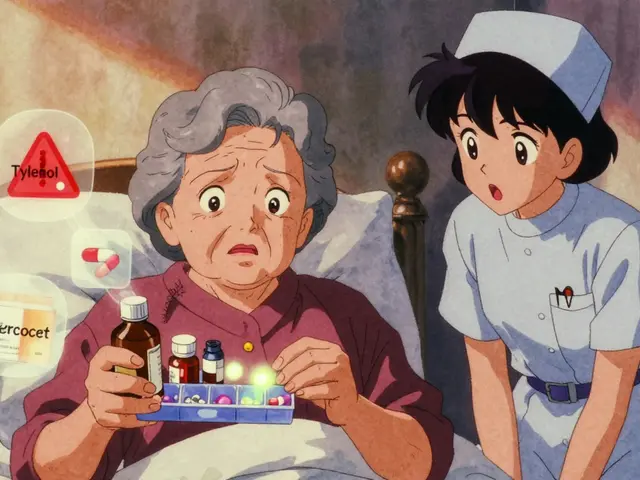

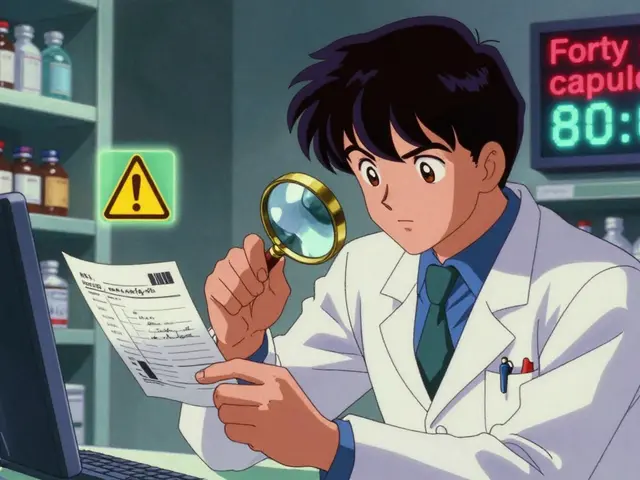
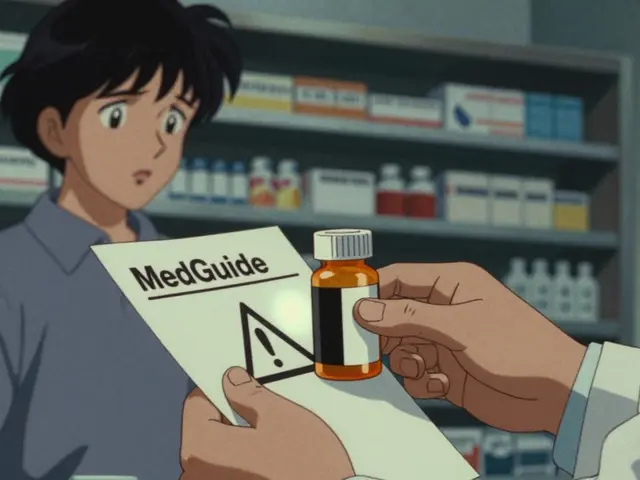
10 Comments
I never thought about how many random pills I’m still taking from last year’s cold. I found three expired ibuprofen and a bottle of ginkgo biloba I haven’t touched since 2021. My pharmacist laughed when I showed up with a shoebox full of bottles. We cut two meds and I haven’t felt this clear-headed in years. Seriously, just go. It’s free. You’ve got nothing to lose.
Oh here we go. Another government-funded pharmacy hustle. Next they’ll be making us take a quiz on aspirin before we can buy it. I’ve been taking my meds the same way for 15 years and I’m still standing. If you’re too lazy to read the label, don’t blame the system. This is just another way to make pharmacists feel important while charging taxpayers for a 30-minute chat.
While I appreciate the anecdotal evidence presented, the data cited from the CDC and Outcomes.com is compelling and methodologically sound. The reduction in hospital admissions by 30% among high-risk patients is statistically significant (p < 0.01). Moreover, the fact that 82% of patients reported fewer side effects within 30 days of a Comprehensive Medication Review underscores the clinical utility of pharmacist-led interventions. This is not a luxury; it is a necessary component of patient safety in an era of polypharmacy.
Let’s be real-this whole thing is a corporate ploy disguised as healthcare. Pharmacists aren’t superheroes; they’re overworked cashiers with a white coat. They’re incentivized to cut meds because Big Pharma doesn’t want you on the same drug for life. And don’t get me started on ‘natural’ supplements. Turmeric? It’s basically a fancy spice. But hey, if you wanna hand over your prescription list to some guy in a lab coat who can’t even pronounce ‘clopidogrel,’ be my guest. Just don’t call it medicine.
I used to think my brain fog was just aging. Turns out, it was the melatonin I took every night for five years-and the gabapentin my neurologist forgot to take off my list. When I finally sat down with my pharmacist, she didn’t just look at my pills-she looked at me. Asked about my sleep, my grief, my loneliness. That’s when I realized: it wasn’t the meds that were making me tired. It was the life I’d been living while medicating it away. We cut three things. I started walking again. I cried the first week. And then I slept like a baby. This isn’t about pills. It’s about remembering you’re still alive.
My dad’s on seven meds. He forgets half of them. I used to nag him. Now I just schedule his AMR every January. The pharmacist printed him a color-coded chart with pictures of each pill. He loves it. He even started asking questions. Last month he asked if he could stop the blood thinner because he was tired of bleeding from his gums. The pharmacist didn’t judge. She just called his cardiologist and got him switched to a safer alternative. That’s healthcare. Not ‘take your pills and shut up.’ Real care. I wish every family had this.
Just had my first CMR yesterday. I was skeptical. I thought, ‘I’m healthy, I take three pills, what’s the point?’ Turns out, I was taking two different versions of the same blood pressure med-one from my cardiologist, one from my PCP. And I’d been taking a daily antacid that was making my B12 levels plummet. I’ve been tired for years. My pharmacist said, ‘Your body’s been screaming, and you’ve been giving it Advil.’ I cried in the parking lot. I didn’t know I needed this. But I did. And it’s free. If you’re on more than five meds, go. Just go.
Big Pharma owns the pharmacists now. They’re trained to push you off your meds so they can sell you the next one. That ‘natural’ supplement you think is harmless? Probably got a patent on it. And that ‘free’ review? They’re logging your data for insurance algorithms. They’re trying to get you off statins so they can sell you those new weight-loss drugs. Don’t fall for it. If it ain’t broke don’t fix it. I’ve been on my meds since 2007. I’m still alive. That’s all the proof I need.
Wow. So you’re telling me I need to hand over my entire medicine cabinet to a stranger who can’t even spell ‘ibuprofen’ on the first try? And then believe everything they say? I’ve got a better idea. Let’s just let the AI chatbot decide what I should take. At least it won’t judge me for taking melatonin with wine. You people are ridiculous. I’ll keep my pills and my privacy. Thanks, but no thanks.
My mom’s 82. She took three pills a day. After the review, they stopped two. She started sleeping through the night. She said, ‘I didn’t know I was this tired because of the pills.’ She cried when she realized she didn’t need to be so tired. I wish I’d done this sooner. Don’t wait until you’re in the ER. Just go. Bring the shoebox. Be honest. They’ve seen it all. And they’re not there to shame you. They’re there to help you live.